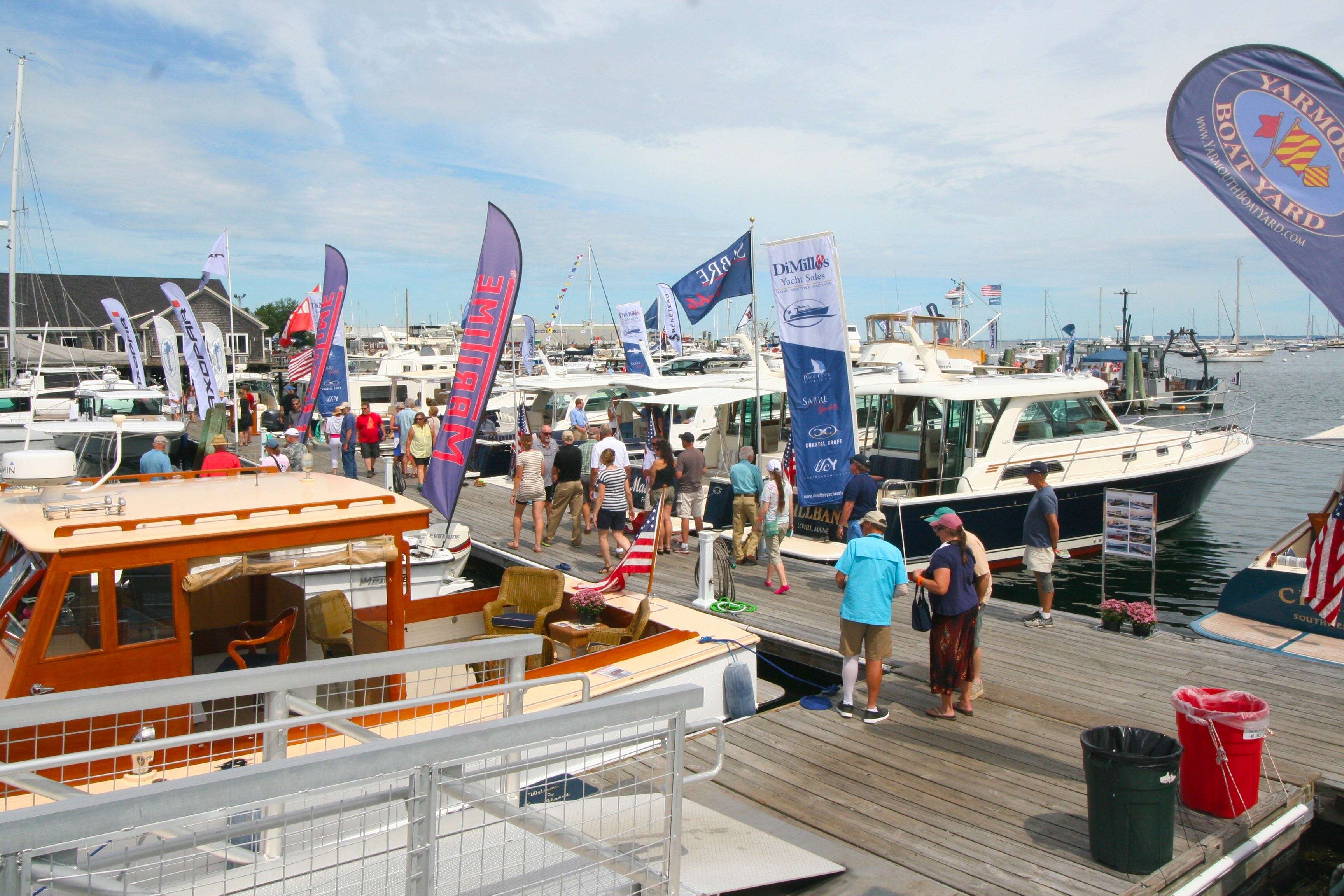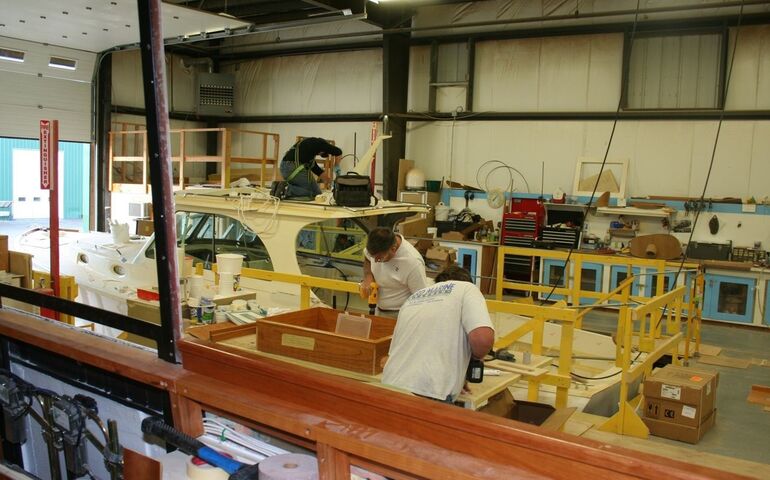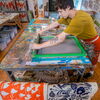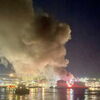
Maine boatbuilders remain confident, but taking a cautious approach
 File photo / Laurie Schreiber
Maine boatbuilders are optimistic the industry will weather the stock market crash and coronavirus pandemic. Seen here is the Hinckley Co.’s boatbuilding plant in Trenton just before the recession, now more than a decade ago.
File photo / Laurie Schreiber
Maine boatbuilders are optimistic the industry will weather the stock market crash and coronavirus pandemic. Seen here is the Hinckley Co.’s boatbuilding plant in Trenton just before the recession, now more than a decade ago.
The 2008-09 recession was a blow to Maine’s boatbuilding industry, with many plants idled and some companies going under. But the current stock market slide, builders told Mainebiz, doesn’t seem to be having the same effect.
At least, not so far.
“I had one customer say, ‘My money is basically safer in a Hinckley than in the market right now,’” said Phil Bennett, Hinckley Co.’s vice president of sales and marketing.
The company’s production plant in Trenton is typically a buzzing hive of activity with numerous luxury yachts in various stages of completion.
But during the 2008/2009 recession, with a sudden drop in orders and mass layoffs, it was eerily quiet.
“Are we going to have a downturn or layoffs? I can’t predict that,” Bennett said. “But we’ve had to shorten sail before and I hope we don’t have to again. If people literally stop spending all together, we’ll be affected by that.”
“All of our customers who have orders in place are still moving forward,” said Bentley Collins, vice president of sales and marketing for Sabre Yachts in Raymond and Back Cove Yachts in Rockland. “None of our dealers are turning down boats and none of our customers are turning down boats.”
Coronavirus concerns are having some impact on Ellis Boat Co.’s charter division, which rents yachts by the week.
“I’ve gotten some cancellations from people who are concerned,” said Shane Ellis, sales and marketing director for the Southwest Harbor company.
So far, six cancellations spanning the season are mainly coming from clients who want to avoid flying, he added.
On the flip side, he’s received inquiries from people who see being in Maine’s relatively isolated environs, and being out on the water, as a plus. He’s optimistic that clients will see charters as the optimal vacation with limited public exposure.
“This is something that people can still do without a whole lot of risk,” he said. “It’s basically quarantining yourself to a boat for a week.”
Health protocols
Ellis has implemented stringent protocols to keep his team of 15 safe from coronavirus.
He’s posted signs on the doors that ban customers and vendors from entering the facility.
“We’ve had a couple of visitors look at the signs and they weren’t too happy about it,” he said. “But they completely understand. They can just call me and I’ll meet them outside.”
So far, delivery personnel are allowed in.
“We make sure their interaction is brief, and they’re not touching a lot of stuff on their way in and out,” he said. “If things get worse, we’ll have an outside drop-off location. We haven’t gotten to that point yet, but that’s our next step.”
The company has boosted its sick leave policy to encourage employees who show any symptoms whatsoever to stay home. There’s an augmented cleaning and disinfecting policy throughout the facility. Shared tools and things like keyboards and doorknobs are regularly wiped down.
“I’m hoping to keep the business moving ahead as usual,” he said.
Other builders have similar protocols.
“Like any business, we are closely monitoring the situation as it rapidly unfolds,” said Bill Grindle, general manager of Wesmac Custom Boats Inc. in Surry. “More questions than answers at this time, unfortunately.”
In a letter to customers and vendors posted yesterday, Grindle said the company plans to maintain business as usual while taking steps to protect employees from illness.
“Spring is a busy time of year for any marine-related operation, and any interruption to our plans will rapidly affect all aspects of our business,” he said.
Sabre and Back Cove have adjusted their family leave program.
“People who are going to lose income if they have to be off the job will continue to be compensated,” Collins said.
Non-essential visits from customers, dealers and vendors are being canceled. The nature of the work, which involves employees working in separate areas of a boat, inherently follows and even exceeds the 6-foot separation precaution, he added.
“People are not shoulder to shoulder,” he said. “They’re in different cabins doing different jobs.”
Supply chain
Ellis is concerned the supply chain might prove challenging at some point.
“So far we’ve been able to get everything we need to do business,” he said. “But if the world really shuts down and we have trouble getting things we need, we’ll need to work around that as best we can.”
Wesmac is monitoring supply chains for availability of products needed to build the boats.
“Working within a global economy is always challenging to a business such as ours,” Grindle said. “Times like this only make it more difficult.”
Diversification

Diversification proved key to allowing boatbuilding companies to survive the recession.
At Ellis Boat, the charter division is relatively new; the company also provides new construction, storage and service. It’s finishing up a new Ellis 28 powerboat and doing some restorations of older boats.
Ellis is optimistic that the diversified business will weather today’s storms.
“I’ve had to hire more people recently,” he said. “Before this all happened, we experienced a bit of growth at the company. I see us as having plenty of work and staying in operation.”
Still, he added, “Everything is up in the air. People could call and say, ‘Stop work on my boat, because the stock market crashed and my portfolio is no longer what it was.’”
“We couldn’t survive if we only built new boats,” said Bennett. “We have brokerage boats and we have our service business. Our business model needs all three in order for us to be stable.”
During the recession, Sabre and Back Cove continued to develop new models in order to be ready when the market returned.
“What we learned is never stop moving forward,” Collins said. “The people who stood still during the recession were the ones who were beaten up the worst.”










0 Comments